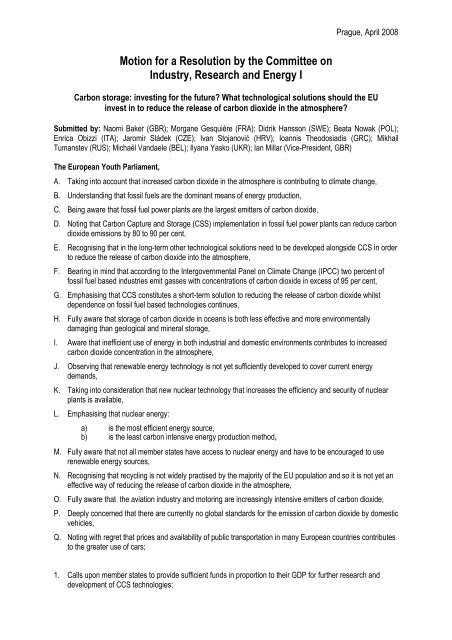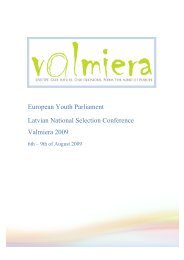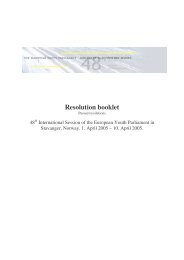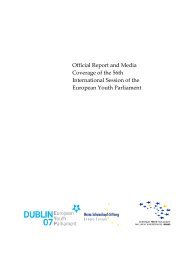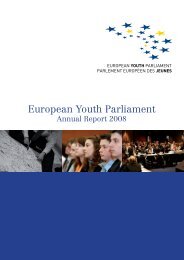Resolution - European Youth Parliament
Resolution - European Youth Parliament
Resolution - European Youth Parliament
Create successful ePaper yourself
Turn your PDF publications into a flip-book with our unique Google optimized e-Paper software.
Motion for a <strong>Resolution</strong> by the Committee on<br />
Industry, Research and Energy I<br />
Prague, April 2008<br />
Carbon storage: investing for the future? What technological solutions should the EU<br />
invest in to reduce the release of carbon dioxide in the atmosphere?<br />
Submitted by: Naomi Baker (GBR); Morgane Gesquière (FRA); Didrik Hansson (SWE); Beata Nowak (POL);<br />
Enrica Obizzi (ITA); Jaromir Sládek (CZE); Ivan Stojanović (HRV); Ioannis Theodosiadis (GRC); Mikhail<br />
Tumanstev (RUS); Michaël Vandaele (BEL); Ilyana Yasko (UKR); Ian Millar (Vice-President, GBR)<br />
The <strong>European</strong> <strong>Youth</strong> <strong>Parliament</strong>,<br />
A. Taking into account that increased carbon dioxide in the atmosphere is contributing to climate change,<br />
B. Understanding that fossil fuels are the dominant means of energy production,<br />
C. Being aware that fossil fuel power plants are the largest emitters of carbon dioxide,<br />
D. Noting that Carbon Capture and Storage (CSS) implementation in fossil fuel power plants can reduce carbon<br />
dioxide emissions by 80 to 90 per cent,<br />
E. Recognising that in the long-term other technological solutions need to be developed alongside CCS in order<br />
to reduce the release of carbon dioxide into the atmosphere,<br />
F. Bearing in mind that according to the Intergovernmental Panel on Climate Change (IPCC) two percent of<br />
fossil fuel based industries emit gasses with concentrations of carbon dioxide in excess of 95 per cent,<br />
G. Emphasising that CCS constitutes a short-term solution to reducing the release of carbon dioxide whilst<br />
dependence on fossil fuel based technologies continues,<br />
H. Fully aware that storage of carbon dioxide in oceans is both less effective and more environmentally<br />
damaging than geological and mineral storage,<br />
I. Aware that inefficient use of energy in both industrial and domestic environments contributes to increased<br />
carbon dioxide concentration in the atmosphere,<br />
J. Observing that renewable energy technology is not yet sufficiently developed to cover current energy<br />
demands,<br />
K. Taking into consideration that new nuclear technology that increases the efficiency and security of nuclear<br />
plants is available,<br />
L. Emphasising that nuclear energy:<br />
a) is the most efficient energy source,<br />
b) is the least carbon intensive energy production method,<br />
M. Fully aware that not all member states have access to nuclear energy and have to be encouraged to use<br />
renewable energy sources,<br />
N. Recognising that recycling is not widely practised by the majority of the EU population and so it is not yet an<br />
effective way of reducing the release of carbon dioxide in the atmosphere,<br />
O. Fully aware that the aviation industry and motoring are increasingly intensive emitters of carbon dioxide,<br />
P. Deeply concerned that there are currently no global standards for the emission of carbon dioxide by domestic<br />
vehicles,<br />
Q. Noting with regret that prices and availability of public transportation in many <strong>European</strong> countries contributes<br />
to the greater use of cars;<br />
1. Calls upon member states to provide sufficient funds in proportion to their GDP for further research and<br />
development of CCS technologies;


